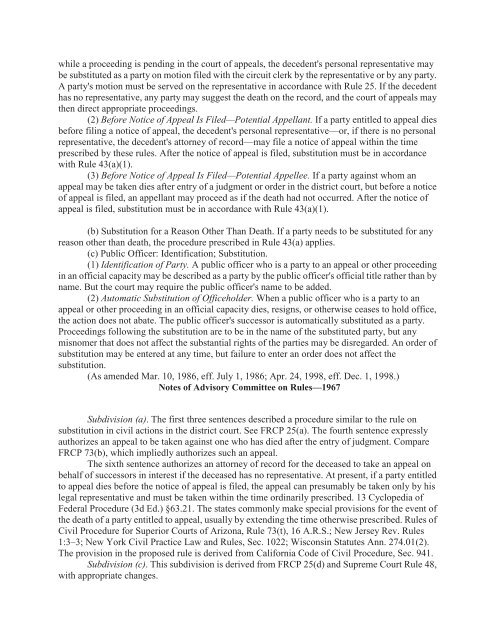Federal Rules of Appellate Procedure 2014-2015, 2014a
Federal Rules of Appellate Procedure 2014-2015, 2014a
Federal Rules of Appellate Procedure 2014-2015, 2014a
Create successful ePaper yourself
Turn your PDF publications into a flip-book with our unique Google optimized e-Paper software.
while a proceeding is pending in the court <strong>of</strong> appeals, the decedent's personal representative may<br />
be substituted as a party on motion filed with the circuit clerk by the representative or by any party.<br />
A party's motion must be served on the representative in accordance with Rule 25. If the decedent<br />
has no representative, any party may suggest the death on the record, and the court <strong>of</strong> appeals may<br />
then direct appropriate proceedings.<br />
(2) Before Notice <strong>of</strong> Appeal Is Filed—Potential Appellant. If a party entitled to appeal dies<br />
before filing a notice <strong>of</strong> appeal, the decedent's personal representative—or, if there is no personal<br />
representative, the decedent's attorney <strong>of</strong> record—may file a notice <strong>of</strong> appeal within the time<br />
prescribed by these rules. After the notice <strong>of</strong> appeal is filed, substitution must be in accordance<br />
with Rule 43(a)(1).<br />
(3) Before Notice <strong>of</strong> Appeal Is Filed—Potential Appellee. If a party against whom an<br />
appeal may be taken dies after entry <strong>of</strong> a judgment or order in the district court, but before a notice<br />
<strong>of</strong> appeal is filed, an appellant may proceed as if the death had not occurred. After the notice <strong>of</strong><br />
appeal is filed, substitution must be in accordance with Rule 43(a)(1).<br />
(b) Substitution for a Reason Other Than Death. If a party needs to be substituted for any<br />
reason other than death, the procedure prescribed in Rule 43(a) applies.<br />
(c) Public Officer: Identification; Substitution.<br />
(1) Identification <strong>of</strong> Party. A public <strong>of</strong>ficer who is a party to an appeal or other proceeding<br />
in an <strong>of</strong>ficial capacity may be described as a party by the public <strong>of</strong>ficer's <strong>of</strong>ficial title rather than by<br />
name. But the court may require the public <strong>of</strong>ficer's name to be added.<br />
(2) Automatic Substitution <strong>of</strong> Officeholder. When a public <strong>of</strong>ficer who is a party to an<br />
appeal or other proceeding in an <strong>of</strong>ficial capacity dies, resigns, or otherwise ceases to hold <strong>of</strong>fice,<br />
the action does not abate. The public <strong>of</strong>ficer's successor is automatically substituted as a party.<br />
Proceedings following the substitution are to be in the name <strong>of</strong> the substituted party, but any<br />
misnomer that does not affect the substantial rights <strong>of</strong> the parties may be disregarded. An order <strong>of</strong><br />
substitution may be entered at any time, but failure to enter an order does not affect the<br />
substitution.<br />
(As amended Mar. 10, 1986, eff. July 1, 1986; Apr. 24, 1998, eff. Dec. 1, 1998.)<br />
Notes <strong>of</strong> Advisory Committee on <strong>Rules</strong>—1967<br />
Subdivision (a). The first three sentences described a procedure similar to the rule on<br />
substitution in civil actions in the district court. See FRCP 25(a). The fourth sentence expressly<br />
authorizes an appeal to be taken against one who has died after the entry <strong>of</strong> judgment. Compare<br />
FRCP 73(b), which impliedly authorizes such an appeal.<br />
The sixth sentence authorizes an attorney <strong>of</strong> record for the deceased to take an appeal on<br />
behalf <strong>of</strong> successors in interest if the deceased has no representative. At present, if a party entitled<br />
to appeal dies before the notice <strong>of</strong> appeal is filed, the appeal can presumably be taken only by his<br />
legal representative and must be taken within the time ordinarily prescribed. 13 Cyclopedia <strong>of</strong><br />
<strong>Federal</strong> <strong>Procedure</strong> (3d Ed.) §63.21. The states commonly make special provisions for the event <strong>of</strong><br />
the death <strong>of</strong> a party entitled to appeal, usually by extending the time otherwise prescribed. <strong>Rules</strong> <strong>of</strong><br />
Civil <strong>Procedure</strong> for Superior Courts <strong>of</strong> Arizona, Rule 73(t), 16 A.R.S.; New Jersey Rev. <strong>Rules</strong><br />
1:3–3; New York Civil Practice Law and <strong>Rules</strong>, Sec. 1022; Wisconsin Statutes Ann. 274.01(2).<br />
The provision in the proposed rule is derived from California Code <strong>of</strong> Civil <strong>Procedure</strong>, Sec. 941.<br />
Subdivision (c). This subdivision is derived from FRCP 25(d) and Supreme Court Rule 48,<br />
with appropriate changes.


















